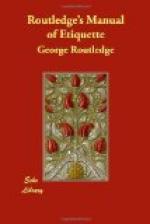It is possible, however, that the lover’s endeavours to procure the desired introduction may fail of success, although, where no material difference of social position exists, this difficulty will be found to occur less frequently than might at first be supposed. He must then discreetly adopt measures to bring himself in some degree under the fair one’s notice: such, for instance, as attending the place of worship which she frequents, meeting her, so often as to be manifestly for the purpose, in the course of her promenades, &c. He will thus soon be able to judge—even without speaking to the lady—whether his further attentions will be distasteful to her. The signs of this on the lady’s part, though of the most trifling nature, and in no way compromising her, will be unmistakeable; for, as the poet tells us in speaking of the sex:—
“He gave them but one tongue to
say us ‘Nay,’
And two fond eyes to grant!”
Should her demeanour be decidedly discouraging, any perseverance on his part would be ungentlemanly and highly indecorous. But, on the other hand, should a timid blush intimate doubt, or a gentle smile lurking in the half-dropped eye give pleasing challenge to further parley when possible, he may venture to write—not to the lady—that would be the opening of a clandestine correspondence, an unworthy course where every act should be open and straightforward, as tending to manly and honourable ends—but, to the father or guardian, through the agency of a common friend where feasible; or, in some instances, to the party at whose residence the lady may be staying. In his letter he ought first to state his position in life and prospects, as well as mention his family connections; and then to request permission to visit the family, as a preliminary step to paying his addresses to the object of his admiration.
By this course he in nowise compromises either himself or the lady; but leaves open to both, at any future period, an opportunity of retiring from the position of courtship taken up on the one side, and of receiving addresses on the other, without laying either party open to the accusation of fickleness or jilting.
* * * * *
II.—ETIQUETTE OF COURTSHIP.
In whatever way the attachment may have originated, whether resulting from old association or from a recent acquaintanceship between the lovers, we will assume that the courtship is so far in a favourable train that the lady’s admirer has succeeded in obtaining an introduction to her family, and that he is about to be received in their domestic circle on the footing of a welcome visitor, if not yet in the light of a probationary suitor.
In the first case, matters will in all probability be found to amble on so calmly, that the enamoured pair may seldom find it needful to consult the rules of etiquette; but in the latter, its rules must be attentively observed, or “the course of true love” will assuredly not run smooth.




